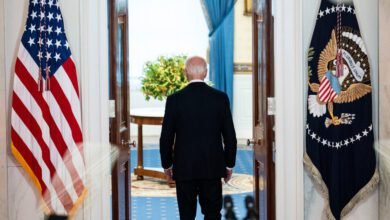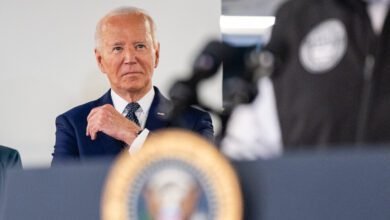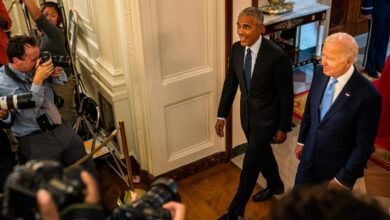The handover of local power once again affected the political center

Unlock Editor’s Digest for free
FT editor Roula Khalaf selects her favorite stories in this weekly newsletter.
It’s hard to imagine Count Binface, the independent space warrior, as mayor of New York, Paris or Chicago. The earl’s regular appearances at the polls, this time for mayor of London, reflect England’s love of satire. But it also reflects our desire for a more independent politics.
The upcoming results of local and mayoral elections in the United Kingdom are being analyzed for clues about the national scenario. Will Rishi Sunak face a leadership challenge? Could the Greens win more than one deputy? This was not the aim of the devolution experiment the country embarked on 25 years ago.
England and Wales have just voted in favor of a bewildering mosaic of 10 metropolitan mayors, 37 police and crime commissioners and 2,636 local councillors. Few normal people can tell you what the responsibilities of these roles are or how they relate to the local deputy. Accountability has become murkier, not less, with local media scrutiny collapsing and turnout rarely exceeding 36 percent in local elections in England, about half that of general elections.
When New Labor created its first wave of mayors in 2000, it was inspired by independent and charismatic American mayors who had a track record of bringing investment and dynamism to their cities. Under David Cameron, the Conservatives continued to devolve power. Police and crime commissioners, introduced in 2012, were designed to emulate the crime-reducing success of Bill Bratton, the New York City police commissioner.
With all major political parties agreeing on the need for greater decentralization, it is time to take stock. Are these new positions really strengthening local democracy, or are they just adding more layers, titles and executive positions, and charging the taxpayer for the privilege?
Far from being independent-minded outsiders determined to shake things up, many candidates for these positions are long-time members. The South Yorkshire PCC resigned because he had previously been head of children’s services during the grooming scandal in Rotherham. The Northamptonshire PCC recently agreed not to run again after making misogynistic comments and appointing a friend with no operational experience to head the county fire service.
However, most mayors are nominated and elected through party machines. The narrow re-election of Ben Houchen, the Conservative mayor of the Tees Valley, cheered Downing Street after a catastrophic night of Tory defeats. Houchen has local popularity, but he also accepted a conservative peerage, which ties him closely to a party.
Arguably the UK’s most popular Speaker was its most independent. Stuart Drummond, who ran for Hartlepool mayor in 2002 to promote the local football club dressed as its monkey mascot, never intended to win. After overcoming the shock, he accepted, was re-elected three times and elected the tenth best mayor in the world.
It is also arguable that the UK’s most effective Speaker of the House to date is Ken Livingstone, the radical left firebrand who became London’s first Mayor, to the horror of Tony Blair. Running against the Labor Party as an independent, “Red Ken” helped craft London’s successful bid for the Olympics, introduced the universal “Oyster” travel card and congestion charge in central London, initiated the scheme that became known by its successor as “Boris Bicycles” and revived the bus network. The most recent incumbent, Sadiq Khan, still awaiting results from London, was so mired in party politics between a Conservative government, a Labor speaker and a local Labor council, that he was unable to even reopen Hammersmith Bridge.
Some mayors have a genuine claim that there is a net gain for their areas. Former Labor MP Andy Burnham, who became Mayor of Greater Manchester, stepped onto the national stage when he opposed central government attempts to impose tougher restrictions on some regions during the pandemic. West Midlands Mayor Andy Street, a Conservative, went public with his fury at Sunak’s decision to cut the northern section of the HS2 rail link, then worked deftly behind the scenes to try to save parts of the route. But there is no solid evidence that the PCCs have reduced crime.
Difficult questions must be asked about cost/benefit and responsibility. Will mayors end up attracting money from one region to another? Where is the scrutiny, with the collapse of local media? How can the Treasury justify funneling more money to metropolitan mayors while at the same time continuing to cut spending on local authorities, some of which are bankrupt?
I say this as a fan of the original movement. In the 2000s, I attended serious meetings about Bratton’s data command and Mayor Tom Bradley’s light rail network in Los Angeles. Thinkers like Tony Travers, Trevor Phillips and Nick Boles of Policy Exchange wanted to break up the UK’s monolithic central government and restore power to local people. We were disappointed that the public repeatedly rejected mayors in 37 of the 54 places that held a referendum. Now I wonder if these voters were right to be skeptical.
Compared to most of Europe and America, the UK is overly centralized. It is quite possible that the low turnout in elections for councils, mayors and PCC simply reflects their relative lack of power, compared to their counterparts in other countries. And, as supporters point out, the experiments are still in their infancy.
I supported mayors because I believe that politics is better when it is less partisan. Seven of the top ten councils are in coalition or run by independents. Some of the worst occur in places where the same political party always wins, so there is no realistic challenge to a lazy or ineffective administration. This is the dynamic we need to change: and until that happens, the last laugh may be Count Binface’s.
camilla.cavendish@ft.com




